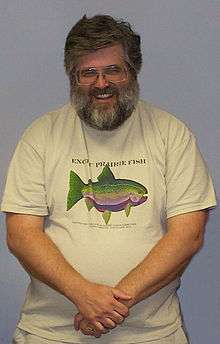Christopher G. Atkeson
| Christopher G. Atkeson | |
|---|---|
 | |
| Born | 1959 |
| Residence | Pittsburgh, PA |
| Nationality | American |
| Fields | Robotics and Machine Learning |
| Institutions |
Carnegie Mellon University Georgia Institute of Technology Massachusetts Institute of Technology |
| Alma mater |
Massachusetts Institute of Technology Harvard University |
| Doctoral advisor | Emilio Bizzi |
Christopher Granger Atkeson (born 1959) is an American roboticist and a Professor at the Robotics Institute and Human-Computer Interaction Institute at Carnegie Mellon University. Atkeson is known for his work in humanoid robots, soft robotics,[1] and machine learning, most notably on locally weighted learning.[2]
Early life and education
Atkeson graduated summa cum laude from Harvard University in 1981 with an A.B. in Biochemistry. He received his S.M. degree in Applied Mathematics in the same year, also from Harvard. He then attended the Massachusetts Institute of Technology and received his PhD in Brain and Cognitive Science from the in 1986, advised by Emilio Bizzi.
Career
Before joining the faculty at CMU in 2000, he was an Assistant, then Associate Professor in the department of Brain and Cognitive Sciences at MIT from 1986-1993, an Associate Professor at the College of Computing, Georgia Institute of Technology from 1994 to 2000.
Atkenson's work in soft robotics helped influence production on the 2014 Disney film Big Hero 6, and he consulted with the film's production team on the design of Baymax.[3]
Honors and awards
- National Science Foundation Engineering Initiation Award, 1987-1988.
- National Science Foundation Presidential Young Investigator Award, 1988-1993.
- W. M. Keck Foundation Assistant Professorship in Biomedical Engineering, 1988-1990.
- Alfred P. Sloan Research Fellow, 1989-1991.
- W. M. Keck Foundation Associate Professorship in Biomedical Engineering, 1990-1991.
- Teaching Award from the MIT Graduate Student Council, 1990.
- Edenfield Faculty Fellowship Award, 1995.
- Elected by faculty to College of Computing Dean’s Advisory Committee, 1995–1996, 1996–1997.
- Finalist, Best Paper Award, ICRA 2000.
Personal life
Atkeson is married to Jessica Hodgins, Professor of Computer Science and Robotics at CMU and the Director of Disney Research, Pittsburgh.
References
- ↑ Hardy, Quentin (2015-04-14). "The Robotics Inventors Who Are Trying to Take the 'Hard' Out of Hardware". The New York Times. ISSN 0362-4331. Retrieved 2016-08-15.
- ↑ Atkeson, C.G.; Moore, A.W.; Schaal, S. (1997). "Locally weighted learning". Artificial Intelligence Review. 11 (1): 11–73.
- ↑ Trimboli, Brian (Nov 9, 2014). "CMU's soft robotics inspire Disney's movie Big Hero 6 - The Tartan". The Tartan. Carnegie Mellon University. Retrieved 2016-08-15.